Q. My husband and I were both married before and
we were both in very difficult marriages with a great deal of arguing and
fighting. We want to be sure we don’t repeat that pattern again. We’ve just
been married a few months and so far we’ve gotten along well. What can we do to
avoid conflict in this marriage?
A. It is
impossible to avoid conflict in a close relationship. However, you can learn to
handle conflict so that it helps the relationship rather than hurting it. Avoiding
conflict and keeping the peace at all costs doesn’t work. When we avoid
conflict, issues are decided by not being decided. Avoidance of conflict also
can cause hidden resentment if either person feels they’re giving in or aren’t
being heard.
Guide Lines
One tool
that often helps couples resolve differences is to agree to ground rules in the
way issues are discussed. The following guide lines will help.
1. Stick
to one issue. If you’re upset about many issues, make a list of them and discuss
them one at a time. Start with just one and stick to that issue.
2. Use “I
statements” and good listening skills to understand each other’s point of view
on the issue. For example, “I would like
you to…” rather than “You never…” or “You always…”
3. Define
the problem. For example, you may feel rejected because your husband is
watching TV during much of his free time. He may view your comments about this
as nagging and feel you don’t understand his need to relax after a hard day at
work. To define the problem think about what it is you want from each other. Perhaps
you need his undivided attention for a half hour each evening. Perhaps he needs
time to unwind watching TV. Once the problem is defined it’s easier to go on to
the solutions.
4. List
all the possible solutions without censoring any. Use your creativity and
imagination to come up with many solutions. We often see only two solutions -
mine and yours. There are many solutions to most every problem.
5. Look
at all the solutions and think about the pros and cons of each one. Is there
one that will meet the needs of both of you - at least partially?
The above
guide lines take time, persistence and practice so don’t give up.
Settling Decisions
Communication
is helped also by knowing there are several ways decisions can be settled: by
consensus, compromise, agree to disagree, and by policies.
1. Consensus
or agreement may be reached. Some decisions can be made by consensus after
there is open communication. This may happen as a result of one partner becoming
convinced the other one has a good idea. Agreement can also come about when a
couple arrive at a new choice that both find pleasing.
2. Compromise
may be reached. Compromise involves each partner giving a little to meet
the needs of the other and each partner getting part of what they want.
3. You
may agree to disagree. Some issues do not require agreement because they’re
matters of personal preference. Couples may disagree about politics, for
example. Couples may enjoy debating
these differences but it’s not necessary for agreement to be reached. We don’t
have to think exactly alike on everything.
4. Policies
can be established. It’s helpful for couples to agree on policies before problems
begin. Most couples over time develop policies without writing them down. It’s
even more helpful to write these policies down. For example, you might agree on
a policy that one person’s needs takes precedence over the other person’s
wants. This would mean that buying a washing machine comes before purchasing a
boat. Or the need for a car takes precedence over new furniture.
Another
policy might be that the one with the strongest preference makes the
decision. Couples can use a rating scale
from 1-10 to tell each other how important a preference is. If one partner is
an eight about eating at LaRosa’s and the other is a five for Applebee’s, the
eight makes the decision. This works unless the same person always has stronger
preferences than the other one.
A policy
relating to chores might state that the partner who has the time or the partner
who is most able will do the job. A related policy would state that the person
who is expected to do the work will have the final say on how and when a job is
done.
Couples
might also adopt a policy that when they are away from their partner they can
each do, say, and wear whatever they want. When they are together they will not
do anything that bothers or embarrasses the other. Couples may also want to
adopt policies about the use of money, handling children, in-laws, and their
use of time.
Some
times we can’t reach a decision; we aren’t ready to decide about an issue. Then
we can agree to continue talking. Set a time and day to do this. If after
several serious attempts to solve the issue you still are at an impasse, counseling
can help. Also very helpful are marriage educational groups such as The Third
Option and Marriage Enrichment.
“Arrogant know it alls stir up discord,
but wise men and women listen to each other’s counsel.” Proverbs 13:10 The Message
“You may
have to draw straws when faced with a tough decision.” Proverbs 18:18 The Message
Blessings,
Dottie





